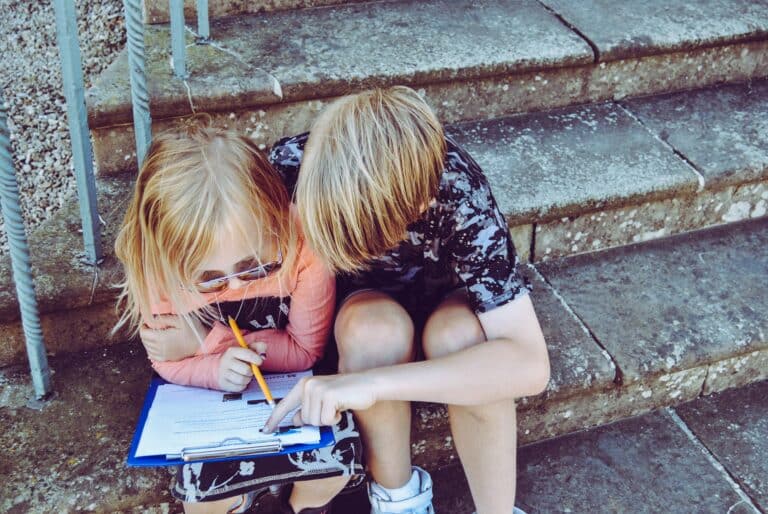Sibling conflict: a survival guide for parents
Sibling conflict can really leech the fun out of family time. A day of constant mediation between bickering children sends the best of us running for the wine feeling like a battered referee after an ill-tempered football match rather than the nurturing and wise moral guide we aspire to be. We tie ourselves in knots trying to be even-handed (how do you know who started it?!), desperately garnering wellbeing for all sides, with usually only guilt or despair to show for it.
So what can we do to survive and minimise sibling conflict? Here are my top tips for staying sane and reducing the bickering.
Have realistic expectations
Some squabbling between children is inevitable. Siblings compete for their parents’ attention (it’s what Darwinians call the evolutionary struggle for the milk supply!). Sibling conflict is also used by some children as a way of defining their own identity and unique niche within the family (“Whatever she likes, I don’t!“). No matter what the cause, no child is born with a full set of social skills intact. All children have to develop the social strategies needed to co-operate and negotiate and the emotional regulation to cope gracefully when they don’t get their own way. Siblings need to learn to resolve their disagreements peacefully, it’s a process – it’s just that some of them learn it quicker than others!
Look after yourself
It’s hard to be a calm, consistent parent when you are tired or stressed. Constant sibling conflict can tip the most saintly of us over the edge. Find time to recharge regularly. Do one thing each day that is just for you and prioritise your own wellbeing. Spending some time away from children (preferably with people who speak nicely to each other) is essential.
Teach turn taking
Parents can encourage sharing and co-operation through simple games such as Snap or board games. Start by playing these games with your children to show them how to take turns – your turn, my turn, your turn, my turn. Praise them for playing co-operatively and give them words to use when things go wrong (“It’s my turn now. Please can I have a go.”). See Teaching children to share FAQs for more on this.
Coach them in problem-solving
Parents are brilliant problem-solvers. The trouble is, we solve problems so quickly that we don’t always allow our children to do it for themselves or teach them how to do it. Family meetings are a great way to introduce to children the skills needed for joint problem-solving and decision-making. And next time your children are bickering over a toy (or anything else), don’t solve the problem for them, coach them to come up with their own solution. (See Teaching children problem-solving skills for more on this.)
Pay attention when they get it right
It’s tempting to slope off and put the dinner on when the kids are playing nicely. But if we do that all the time, then children can learn to use sibling conflict to get attention. There is nothing more guaranteed to make Mum come running (full attention blazing) than whacking your younger brother over the head with a heavy object! Remember to pay attention and praise them when they are playing nicely (before you sneak off to start dinner) – it might mean you get a few more minutes to get something done. If praise alone doesn’t work, try a reward chart!
Be consistent when sibling conflict occurs
If your children start to fight over an activity, don’t shout or get into a debate or join in the argument, just tell them to stop. And if they don’t, apply a suitable consequence immediately. Take the activity away for five minutes, or use Quiet Time or Time Out for more aggressive behaviour. Children are quick learners and if you are consistent, they will reduce behaviour that doesn’t have a good pay-off. (See Why consistency matters.)
Help children learn to manage their feelings
Sibling conflict can escalate when children don’t know the right ways to express their big feelings. Teach children to manage their emotions by saying what you see and encouraging them to express their emotions in appropriate ways: “I can see you are angry. But it is not okay to hit your brother. Use words to tell him how you feel and what you want.” Notice and praise them when they get it right and teach them coping and calming strategies such as counting to ten, slow breaths or just walking away: “Well done for walking away when your sister was teasing you.” (For specific ideas on dealing with tweens and teens, see How do I cope with Teenage Tantrums?)
It’s not a magic wand, and there will definitely still be some of ‘those moments’. But, hopefully, you’ll stay sane. Let me know how you get on!
(You might also find these Children’s books about sibling rivalry handy for talking about the topic with your child.)








So far, so good in our camp. I’m sure the worst is yet to come, with two girls just 2.5 years apart. Thanks for sharing this great advice with the #coolmumclub x x x
You can definitely use some of these tips as prevention too! Good luck 🙂
This is a great post, I am seeing some sibling rivalry at the moment and Alfie is just over 3 years old and his sister 7 months! It’s hard to know how to deal with it really. Thanks for the pointers and for linking up to the #bestandworst 🙂 x
You might be lucky and never have a problem! (But just in case….)